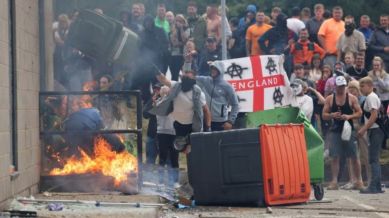Stay updated with the latest - Click here to follow us on Instagram
Why is the UK witnessing nationwide protests?
So far, over 400 people have been arrested, 140 people charged, and three given jail sentences as anti-immigrant riots broke out in several regions, including north London, Bristol, and Newcastle.

For the past few days, the United Kingdom has witnessed widespread unrest and violence triggered by a stabbing incident in Southport on July 29. So far, over 400 people have been arrested, 140 people charged, and three given jail sentences as anti-immigrant riots broke out in several regions, including north London, Bristol, and Newcastle, reportedly fuelled by misinformation and far-right activism.
Cities and towns have anti-racism protesters rallying with more than 100 events anticipated a week after the riots broke out.
monthly limit of free stories.
with an Express account.
The recent riots in the UK have unfolded in a complex and tragic context, primarily triggered by a violent incident in Southport. Here’s a detailed timeline to understand what went down on July 29 and the incidents that transpired into nationwide protests.
July 29 – The triggering incident
Three girls – Bebe King, El Dot Stan, and Alice da Agui, aged 6, 7 and 9, respectively – were stabbed to death during a dance class in Southport on July 29. The attack left eight other children and two adults injured. Authorities arrested a 17-year-old suspect, Axel Rudakubana, who was incorrectly identified as a Muslim immigrant and an asylum seeker who had illegally crossed the border on a boat. Officials clarified that the incident was not being treated as terrorism-related. Meanwhile, the BBC reported that the suspect was born to Rwandan parents in Wales.
Riots erupt in Southport and Hartlepool
The next day the online circulation of the suspects’ incorrect identity sparked anti-immigrant sentiments. A vigil held in Southport turned violent as clashes erupted near a local mosque, followed by clashes with the police, resulting in injuries to over 50 officers and multiple arrests. Rioters attacked the mosque and set a police vehicle on fire. Demonstrations spread to Hartlepool, where protesters hurled objects at the police, leading to several injuries and arrests.
Riots engulf London
A day later, the protests escalated in London, with demonstrators throwing flares at government buildings. The atmosphere was said to be charged with chants of “save our kids” and “stop the boats”. The rioters further targeted hotels housing migrants in Aldershot, resulting in further clashes with the police.
Nationwide protests
On August 2, a police station was set ablaze in Sunderland, and the rioters clashed with law enforcement, resulting in injuries and arrests. Meanwhile, in Birmingham, tensions rose as local communities reacted to rumours of an impending far-right march. The violence continued to spread across various cities, including Liverpool and Bristol, where rioters engaged in confrontations with the police.
Merseyside Police’s chief constable told BBC that the officers on duty “feared they would not make it home”.
Riots in Northern Ireland were reportedly influenced by paramilitary groups, targeting shops and cafes with arson attacks. Whereas, rioters in Liverpool threw bricks at the police personnel, leading to injuries among officers and numerous arrests. The situation was reportedly described as one of the worst outbreaks of violence during the riots.
The commotion extended to Rotherham and Tamworth in the next two days with rioters targeting hotels housing asylum seekers, smashing windows and setting fire to . This marked a significant escalation in the violence against migrant accommodations.
Far-right thuggery, says PM Keir Starmer
Monday, August 5, marked over 400 arrests related to the riots, the police reported, with some individuals as young as 11 years old. UK Prime Minister Keir Starmer condemned the violence, labelling it as “far-right thuggery.” He pledged that those involved in “whatever the apparent cause or motivation” would face legal consequences, including those “whipping up this action online”. However, the Labour Party has been criticised for not containing the violence.
On Tuesday, the government announced the deployment of specialised police units to manage the unrest. The biggest foe of the UK government was misinformation on online platforms, to which the government assured that authorities were collaborating with social media platforms to combat the spread and to ensure the removal of harmful content. The government also pledged to create 500 additional prison spaces for those arrested during the riots.
The same day the High Commission of India in the UK issued an advisory urging Indian citizens visiting the country to remain vigilant. The advisory read, “Indian travellers would be aware of the recent disturbances in some parts of the United Kingdom. The High Commission of India in London is closely monitoring the situation. Visitors from India are advised to stay vigilant and exercise due caution while travelling to the UK.”